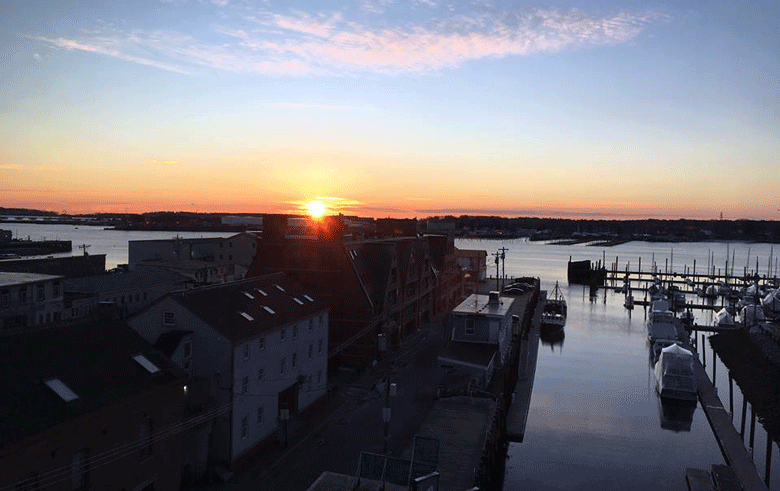In the fall of 1970, 11-year-old Suzanne Clune wrote a letter to her U.S. senator. She lived on the banks of the Little Androscoggin River, a once-pristine tributary where deer could see their reflection when drinking from the water and where spring pine and chokeberry blossoms “filled the air with the sweetest smell on earth.”
That was before toxic chemicals polluted the waters and before noxious waste formed swells of thick, discolored foam that ran downstream and coated the river banks. “Now in any season,” Suzanne wrote to Sen. Edmund Muskie, “you can smell the most sickening smell on earth, a stench that left frogs ‘gasping for air.’ I am sick of the river like this. Please do something about it.”
She signed her letter, “One who loves Maine.”
Maine can’t wait to stem the loss of more than $4 billion a year which we send to out-of-state fossil-fuel companies…
Suzanne’s letter sparked Muskie’s career-long fight for clean air and clean water. Today, as a result of his actions, the Little Androscoggin River is restored as a pristine waterway, like the Androscoggin, the Kennebec, and the Penobscot rivers—places where we now fish and sail and swim, places we love.
I am grateful Suzanne did not wait to act. Before us now is another threat—one that jeopardizes not only Maine’s natural resources but our state’s economic and social wellbeing, too. From our rocky coast to the western foothills, our pine tree forests, our bountiful farmland, and the people and creatures of all kinds who call these places home, the climate crisis poses a direct and immediate threat.
When I think about the current crisis, I think about Suzanne. I think about Sens. Muskie, George Mitchell, Bill Cohen, former legislators like Harry Richardson, Hoddy Hildreth, and Sherry Huber—environmental champions bound not by ideology or political party but by a shared commitment to preserve and protect our cherished home, Maine.
I think of Maine’s indigenous people whose longtime stewardship and connection to the land is threatened by global warming. I think of Pope Francis, who requested an international conversation about the future of the planet, a conversation “which includes everyone, since the environmental challenge we are undergoing, and its human roots, concern and affect us all.”
I think of our children and grandchildren and of generations yet to come. With this crisis on our doorstep, we—like Suzanne Clune—can’t wait. We must act now to preserve our state for our children and grandchildren to enjoy as we do, and to build a thriving economy with opportunities for growth far into the future. Maine can’t wait to heed the warnings of scientists who tell us we cannot delay reducing carbon emissions to stem climate impacts, or preparing our communities to withstand extreme weather events, flooding, and warming that climate change is causing.
Maine can’t wait to improve the lives of Maine people through climate action: weatherizing homes and installing heat pumps to provide both comfort and savings; improving transportation options; increasing access to broadband; and creating greater energy efficiency to lower the maintenance and costs of our homes, cars, buses, and businesses.
Maine can’t wait to strengthen our economy by investing in renewable-energy infrastructure and providing good-paying jobs in clean energy and energy efficiency. Maine can’t wait to stem the loss of more than $4 billion a year which we send to out-of-state fossil-fuel companies every year, and instead keep that money here at home and transition to homegrown clean and renewable energy to power our homes, fight climate change, and move us toward energy independence.
Maine won’t wait to protect our natural resources and the industries that depend on them—forest products, agriculture, fishing and aquaculture—and support efforts to fight climate change while innovating and expanding our workforce. Most of all, Maine can’t wait to make the most of this extraordinary moment in time.
This plan comes in the midst of an unprecedented pandemic which has caused significant economic and social turmoil. It might be easier to put off climate action until calmer times. But Maine can’t wait. Maine shouldn’t wait. And Maine won’t wait. The opportunity for a brighter, sustainable future is here and now. And the need is greater than ever before.
As governor, I propose we more than double the number of clean-energy and energy-efficiency jobs by 2030. These 30,000 jobs will fight climate change while providing new opportunities to Maine working men and women and advancing long-term prosperity for our state.
I will submit bold legislation and proposals for public and private investment. We will seek federal officials as partners and keep a steady focus on our progress. Eleven-year-old Suzanne Clune’s letter to Sen. Muskie 50 years ago was a call to action of that era. Let this plan be today’s call to action—once again to protect the natural beauty of our state, to improve the lives of our families and the livelihoods of our people, and to ward off future natural disasters and economic crises. Because, like Suzanne, we too are “ones who love Maine,” and we must do our best to preserve and protect it.
Janet Mills is the governor of Maine.





